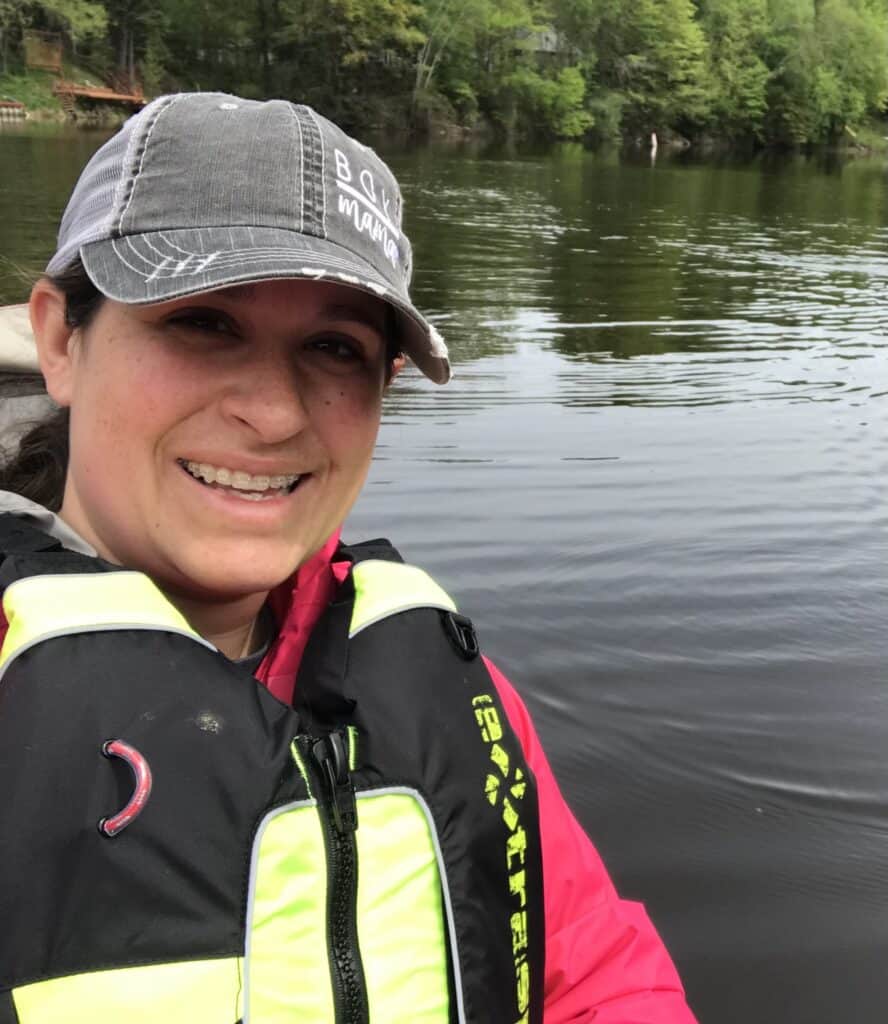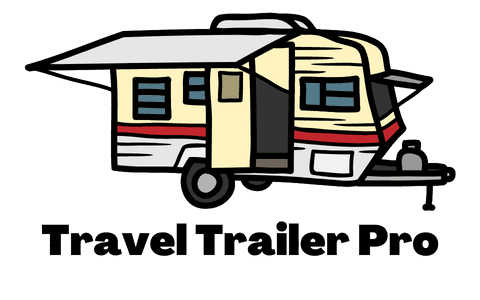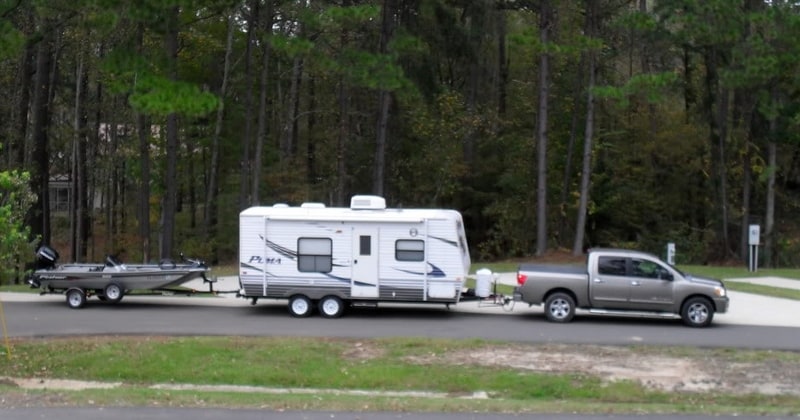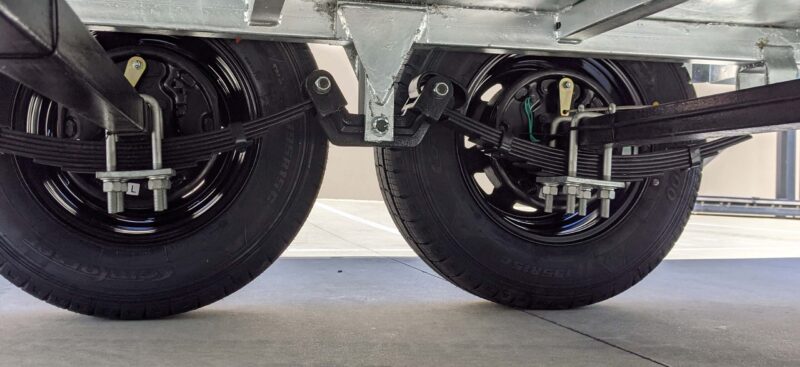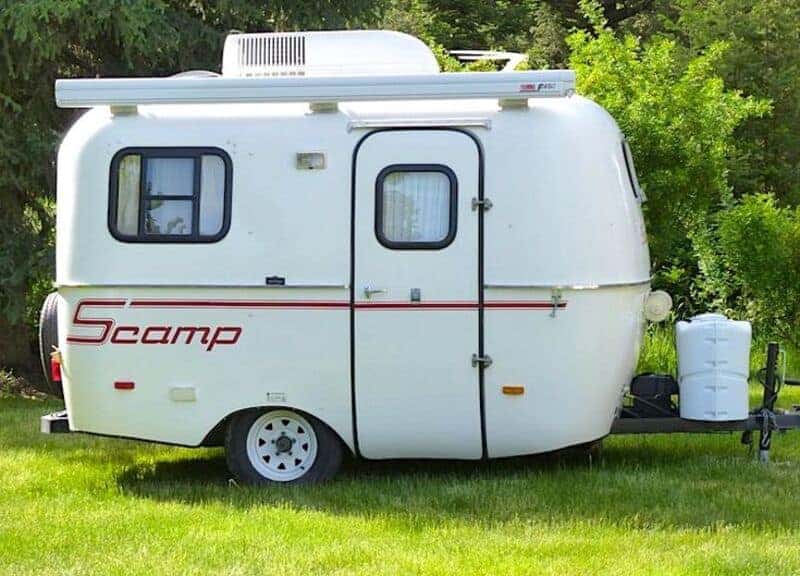If you’ve ever thought about taking your boat along on a trip, you may have wondered if you can tow your boat with an RV. This practice is commonly referred to as double or triple towing. While the terms may be interchangeable, that’s not all you need to know about the practice.
Any time you tow two trailers behind your tow vehicle, that’s triple towing. It’s important to note that this isn’t restricted to just towing a boat with an RV. You could tow any recreational vehicle behind your travel trailer or fifth wheel. You could even use your motorhome to tow two different recreational vehicles.
It’s important to remember that whatever toys are in your triple towing set-up, you need to do your research to see if it’s even legal before hitting the road. Towing a boat, car, golf cart, or any other secondary trailer, behind your RV can be a tricky business. You’ll want to practice, plan, and prepare accordingly.
Is It Safe to Tow a Boat with an RV?
First, let’s look at the safety of towing a boat with your RV. Under the right conditions, triple towing can be accomplished safely. But you need to be aware of potential hazards like the additional length and weight of adding a boat to your towing set-up.
Be sure that even when you’re triple towing, you stay well within your vehicle’s towing capacity. Remember, an overloaded towing set-up can be especially prone to sway.
Likewise, the additional length that a boat trailer adds further complicates your ability to tow safely.
You’ll need to take wider turns, drive slower, and plan on stopping sooner. If you research and practice you can tow a boat with your RV safely, just remember triple towing is an experienced RVers game!
17 Things to Know Before You Tow a Boat with an RV
1. Check If It’s Legal
Each state has its own rules and regulations regarding towing a boat with an RV, or triple towing with a recreational vehicle. Some states ban the practice altogether. Others, like Michigan, permit triple towing with a certain endorsement on your driver’s license, and only when the RV in question is a fifth wheel.
Most states limit the total length of your overall towing set-up. Often there are also rules on weight and vehicle width. Many states also govern the manner in which the vehicles are secured to one another, including the type of hitch and the placement of safety chains.
Since the rules vary state by state, it’s important that you research your route. You can usually find the most up-to-date information on each state’s department of motor vehicles website.
Triple Towing Legality By State
This table summarizes the triple towing rules by the state as of the time of publishing this post.
| STATE | IS TRIPLE TOWING LEGAL | LENGTH RESTRICTIONS |
| Alabama | NO | |
| Alaska | YES | Max Length 75 ft. |
| Arizona | YES (with fifth wheel only) | Max Length 65 ft. |
| Arkansas | YES | Max Length 65 ft.* |
| California | YES | Max Length 65 ft.* |
| Colorado | YES | Max Length 70 ft. |
| Connecticut | YES | Max Length 60 ft. |
| Delaware | NO | |
| Florida | NO | |
| Georgia | NO | |
| Hawaii | YES | Max Length 65 ft.* |
| Idaho | YES | Max Length 65 ft.* |
| Illinois | YES | Max Length 60 ft. |
| Indiana | YES | Max Length 65 ft. |
| Iowa | YES | Max Length 70 ft. |
| Kansas | YES | Max Length 65 ft. |
| Kentucky | YES | Max Length 65 ft. |
| Louisiana | YES | Max Length 70 ft. |
| Maine | NO | |
| Maryland | NO | |
| Massachusetts | NO | |
| Michigan | YES (with fifth wheel only) | Max Length 75 ft. |
| Minnesota | YES (with fifth wheel only) | Max Length 70 ft. |
| Mississippi | YES | Max Length 65 ft.* |
| Missouri | YES | Max Length 65 ft. |
| Montana | YES | Max Length 65 ft. |
| Nebraska | YES | Max Length 65 ft. |
| Nevada | YES | Max Length 70 ft. |
| New Hampshire | NO | |
| New Jersey | NO | |
| New Mexico | YES | Max Length 65 ft.* |
| New York | NO | |
| North Carolina | YES | Max Length 65 ft.* |
| North Dakota | YES | Max Length 75 ft. |
| Ohio | YES | Max Length 65 ft. |
| Oklahoma | YES | Max Length 65 ft. |
| Oregon | NO | |
| Pennsylvania | NO | |
| Rhode Island | NO | |
| South Carolina | NO | |
| South Dakota | YES | Max Length 65 ft.* |
| Tennessee | YES | Max Length 65 ft. |
| Texas | YES | Max Length 65 ft. |
| Utah | YES | Max Length 65 ft. |
| Vermont | YES | Max Length 65 ft.* |
| Virginia | NO | |
| Washington | NO | |
| West Virginia | NO | |
| Wisconsin | YES | Max Length 60 ft. |
| Wyoming | YES | Max Length 65 ft.* |
2. Know Your Towing Capacity
Exceeding the recommended towing capacity of your rig is always dangerous. Since triple towing is already more difficult than regular towing, it’s especially important to know your towing limits and stay within them when towing a boat with an RV.
You’ll need to add the weight of your entire towing setup, the tow vehicle, hitch(es), hitch receiver(s), RV, boat, and boat trailer.
You should always reference the owners’ manuals of every vehicle in your set-up to get the most accurate information on vehicle weight and towing capacity. The sticker on your truck or SUV’s door jamb will also show you these numbers.
3. Backing Up Is Very Difficult
Backing up an RV that’s towing a boat is very difficult, some might say impossible.
Triple towing means you have an exceptionally long apparatus to worry about. Not only that but with two trailers with two hitch points.
Your boat trailer won’t move in the same direction as your RV. You’ll need to anticipate, and be able to control the movement of both trailers.
While we won’t go so far as to say backing up while towing a boat with an RV can’t be done, we strongly recommend a pull-through site while triple towing.
The only time you should even consider backing up your camper while triple towing is when you can first safely disconnect and park your second trailer.
4. You Should Practice
Everything is more difficult while triple towing. Therefore you need to drive slower, brake sooner, and make wider turns. Before you venture out on a road trip towing your boat with your RV, practice is a good idea.
Large parking lots are a great place to practice. If there’s no parking lot with ample open space near you, even a trip or two around the block will help you get a feel for towing your boat with your RV.
5. Carry Adequate Insurance
Always check with your insurance company to ensure that your coverage allows for triple towing. Be conscious of state and local guidelines as well as your towing capacity.
If the length of your rig is too long, or the weight of your load too heavy, your insurance may not pay out in the event of an accident.
6. You’ll Have to Drive Slower and Keep Your Distance
RV trailers are particularly susceptible to travel trailer sway. When you’re towing both a camper and a recreational vehicle behind that camper, your rig will be especially prone to sway.
Drive slower and keep your distance to allow yourself time to react in the event that you begin to fishtail.
7. You Can’t Brake on a Dime
Another reason to keep your distance is that towing a boat with an RV means that you can’t stop on a dime. The added weight and length of your rig both increase the time and space you need to come to a stop.
Don’t forget to make sure that the brakes, trailer brakes, and brake lights are all in perfect working order before venturing out on the road.
8. Make Wide Turns
When you tow a boat with your RV, the length of your rig can become very long. This longer length means that you’ll need to make extra wide turns to avoid striking curbs or other vehicles.
When making a right turn take care to steer the front of the tow vehicle wide enough that the wheels of the second trailer don’t hit the curb.
At the same time, keep the second trailer’s wheels as close to the curb as possible to prevent other motorists from trying to pass you on the right. Be careful that no matter how wide your turn, no portion of your towed trailers enters oncoming traffic.
Left-hand turns require special skills as well. Start in the center of the intersection. If there’s more than one left-turn lane, choose the outermost lane.
Starting your turn from the middle of the intersection minimizes the risk of hitting other vehicles.
Whether turning right or left, be sure to check your mirrors constantly throughout your turn.
9. Consider Adding Additional Mirrors, Reflectors, or Cameras
Although triple towing is tricky, you can invest in a few safety features that make it easier. Side Mirrors will let you better see your trailer and boat while towing.
Back Up Cameras allow you to see where the mirrors can’t. Believe me, when triple towing, there are a lot of blind spots! On the flip side, reflectors can be added to make it easier for other motorists to see your entire rig.
10. You Could Take a Towing Class
If you want to tow your boat with your RV but aren’t confident in your skills, consider taking an RV towing class. In-person or RV online training courses are both great options.
In states like Michigan where you’re required to have a special license to triple tow, there’s study material and a test you’ll need to take to make sure your towing skills are up to par.
11. Plan for More Stops
Towing a boat with your RV can be stressful. To avoid unnecessary gray hairs, plan to travel shorter distances each day. Triple towing will also use more fuel than simply driving your RV, so you’ll need more frequent fuel stops.
Whenever you stop, check all the hitch connections, safety chains, and DOT lights.
12. Verify the Legal Length of Your RV and Boat
Even in states where triple towing is legal, there are often length restrictions you must obey. For instance, in the State of North Dakota, the total length of your pickup, fifth wheel, and second trailer can’t exceed 75 ft.
Be sure to measure the entire setup length, from the front bumper of your tow vehicle to the furthest end of your second trailer. See our article, How to Measure a Travel Trailer, to learn where to start and end your measurements correctly.
13. Check the Weather
Towing a boat with an RV is trickier than other types of towing. You’ll want to make sure that you plan your triple towing road trip during ideal weather conditions.
If it’s windy, rainy, or slippery in any way, it’s a good idea to postpone your trip. Less-than-ideal travel conditions are downright treacherous while triple towing.
14. Hook Up Safety Chains
Safety chains are important whenever you’re towing any kind of trailer. Many states have guidelines and restrictions about safety chains.
For instance, in Michigan, the second trailer must be secured both by a hitch and safety chains attached to the very outermost edge of the fifth-wheel camper. Be sure you cross, and secure your safety chains on every trailer you tow.
15. Determine If You Need a Special License
Some states require a special license to triple tow. The State of Texas requires completing a knowledge test to receive a required endorsement on your driver’s license.
Always check with the Department of Motor Vehicles for each state you’ll be traveling through to determine if you’re allowed to tow your boat and RV via triple towing.
16. No One Can Ride in the Boat While Towing
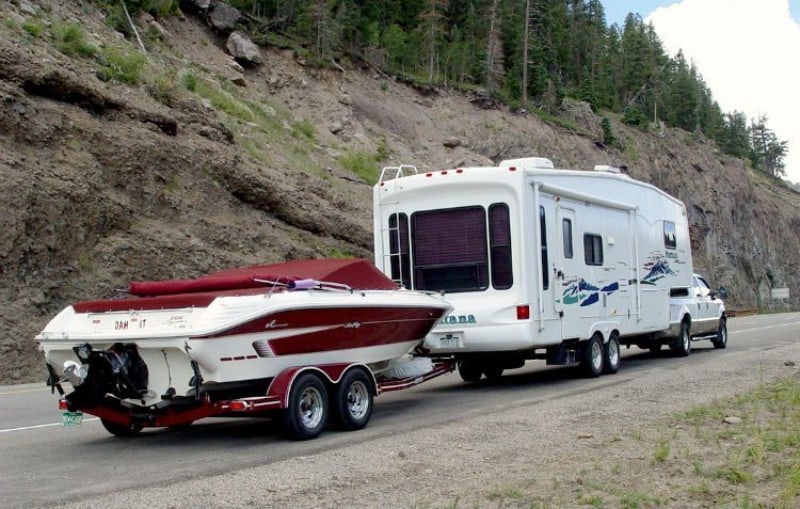
This may seem like it goes without saying, but it’s incredibly unsafe and illegal to have any passengers ride in the boat while towing. If you tow your boat with your RV, be sure all passengers ride in the tow vehicle.
17. Don’t Tow Alone–Have Someone Be a Spotter
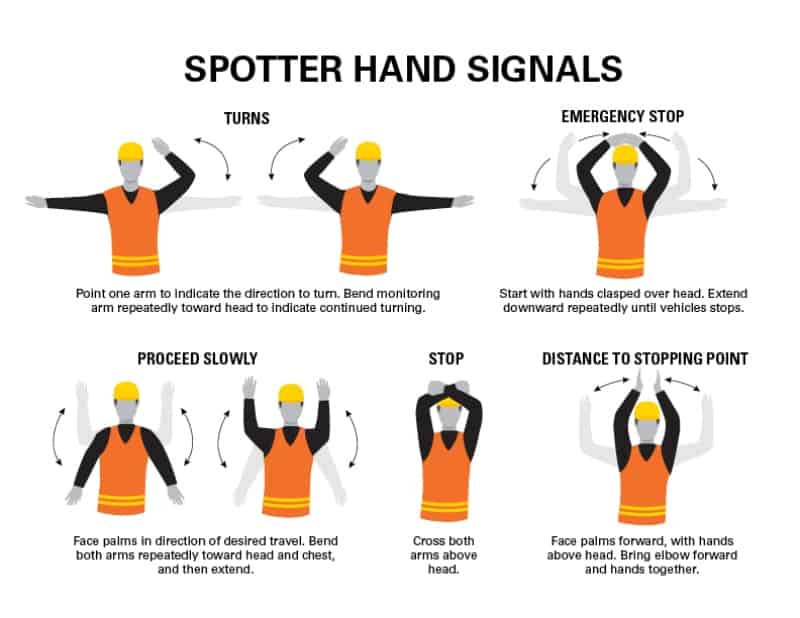
It’s always a good idea to triple tow with at least one passenger. No backup camera or extended mirrors can compensate for the added visibility a spotter can provide.
We always recommend walkie-talkie radios, cell phones, or other communication devices so the driver can communicate with the spotter. If those are unavailable, using spotter hand signals can get the job done safely.
Safety Tips for Towing a Boat with an RV
When towing a boat with an RV, all of the typical RV towing safety tips become even more critical.
Always check that all the tires are inflated to the proper PSI.
Be sure that the brakes on each vehicle are in good working order. Always double-check that brake lights, turn signals, and other DOT-required lights are functioning properly.
If towing with a fifth wheel, be sure the locking jaws have closed around the shank of the trailer kingpin. Traditional bumper-pull ball hitches should be locked in place with sway control equipment, and safety chains hooked up.
Ensure everything else is in proper working order. This includes batteries, belts, hoses, etc.
Be Prepared Before You Try to Tow a Boat with an RV
Towing a boat with your RV can be a great way to get all your recreational vehicles to your destination, but it comes with higher risk. If you do your research, practice triple towing, and ensure that all vehicles are in proper working order, you can reduce that risk.
Preplanning your trip also helps. Avoid towing your boat with your RV in bad weather. Know the towing rules in each state along the way and plan for more frequent stops. You can confidently tow your boat behind your RV if you prepare correctly.
Related Reading:
– How Much Travel Trailer Can A Ford F-150 Tow?
– Ford Lightning Towing Range: How Far Can You Go?
– Why You Must Understand Tongue Weight When Towing
About the Author:
Laura Tyrell is a part-time RVer and full-time mom of three. Long-time campers and RVers before children, Laura, and her husband have fallen even more in love with the RV lifestyle since becoming parents to a child with food allergies.
Having her own kitchen on wheels makes her RV trips amazing. Laura is passionate about finding ways to make traveling with young children fun, easy, and attainable.
